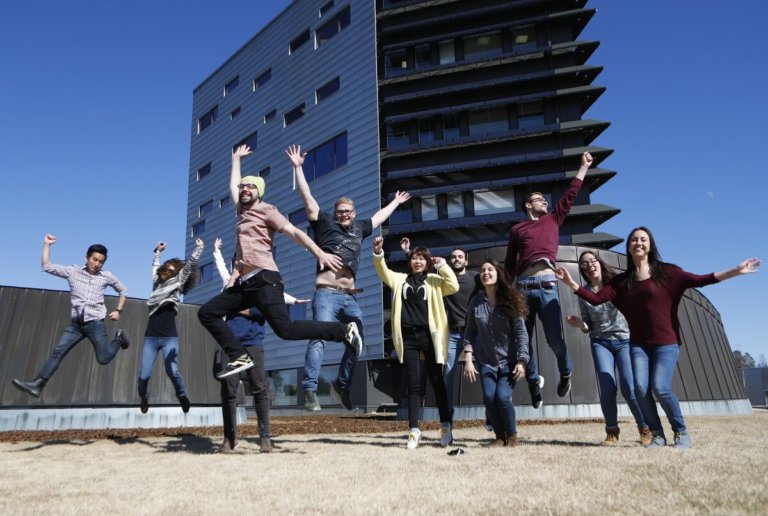
The cloud computing business is growing bigger every day. Between now and 2023, the global cloud computing market size is poised to grow by US$190.32 billion, progressing at a CAGR of over 16 percent.
Attitudes of business owners have certainly changed in the last few years. Where before they would have been sceptical to adopt internet cloud computing, today they can’t wait to add more. While Amazon Web Services was the pioneer in this field, Microsoft is catching up as a strong second contender, with its Microsoft Azure unit – which supplies cloud-based computer processing and storage – growing by 63 percent from a year before in the most recent quarter.
What all this translates to is a wealth of new opportunities emerging for computing professionals today. At Tampere University, a whole department specialises in training computing professionals to take advantage of these opportunities.
The Faculty of Information Technology and Communication Sciences at Finland’s second largest university offers a unique and wide range of expertise through research and teaching. From the natural sciences and engineering to event theatre and drama, this is a Faculty that boldly pushes the boundaries of multidisciplinary research and teaching across organisational boundaries. It’s also Finnish youth’s second most popular choice for a university degree out of 25 universities of applied sciences and 13 Finnish universities. In a recent survey, Tampere University was rated among the top three of universities in five categories and topped the categories for “attractiveness of fields of study” and “city attractiveness”.

Tampere University
At the core of its vision is the aim to provide the knowledge and solutions to the complex challenges of our global, digital and multicultural society. Their new Master of Science in Software, Web and Cloud and Master of Science Technology in Software, Web and Cloud are two postgraduate offerings from this respected institution that realise this vision and more. The detailed course description will be updated and available on the university curriculum page in March 2020, and the courses will start in August 2020.
With a curriculum that provides a solid foundation in computer science and software engineering, Tampere University’s goal is for each student to expand their knowledge and skills in the development of high-quality software. Through in-depth studies and skill development, students gain a good understanding of software engineering, the ability to design and implement large software systems, the ability to manage and improve software development processes as well as the competence and ability to understand, design and implement web- and cloud-based systems.
The official language of the programme is English, meaning all courses, exams and student services are offered in English. Applicants can apply to take a Master of Science degree or a Master of Science (Tech) degree in Software, Web and Cloud, but applicants should note that the eligibility criteria of these two tracks are different. For the Master’s programme in Computing Sciences, Software, Web and Cloud (MSc Tech) track, your previous degree must be in one of the following (or related) fields: computing, computer science, software engineering, information technology or other closely related field with proficiency in mathematics, programming, data structures, databases and physics.
An industrial perspective in one of the world’s most respected education systems
Located in the Tampere region, these are Master degrees that greatly benefit from industry perspectives thanks to the high concentration of IT companies located here. This means students will be able to leverage on one of the university’s biggest strengths: the ability to apply and test learning in real life situations, whether it’s in cities, companies or societal services.
For Software, Web and Cloud MSc students, this doesn’t just manifest in one final semester capstone project. Instead, the curriculum is designed with real-world problems intentionally incorporated, exploring subjects such as requirements management, software modelling and specification, implementation and testing software, software project management, and the web and cloud. Students can mix and match a variety of minor subject studies according to their unique interests from the wide offering of complementary studies this programme offers, such as Data Structures, Database Programming, Innovative Project and Functional Programming.
There is an option to undertake an internship where students apply their knowledge of computer science to practice, expanding their knowledge according to their workplace requirements. Upon completion, they’ll be able to report on their tasks and assess their progress. Add to that the research activities and close collaboration between the university and local industry, and you’ve got a Master’s of high academic quality and real-world relevance to industrial positions.

Tampere University
This bodes well for Tampere graduates entering the global job market today. The US only had 63,744 computer science students join the workforce in 2018, despite more than 500,000 open computing vacancies available nationwide. In Australia, less than 5,000 ICT students graduate annually – comprising only one third of creative arts graduates – yet demand for the broader group of ICT workers in the county projects the current 660,000 will increase to 750,000 by 2023.
Finland is also struggling with a lack of software professionals. By 2020, the Finnish Information Processing Association estimates the country will be short of up to 15,000 IT experts. With its current undersupply of qualified IT professionals, employers are racing to hire IT talent, offering improved workplaces and focusing on job satisfaction. Almost 90 percent of students pursuing software-related majors at Tampere University are employed on the day they graduate.
This demand for computing talent in software and cloud is unlikely to slow down anytime soon. As internet access broadens and increases, every aspect of modern life will increasingly include computing systems. From retail to agriculture to security, industries are expanding their adoption of technologies like the Internet of Things, big data analytics, artificial intelligence, cloud technology and more. There is an urgent need for companies to invest in more skilled talent in order to capitalise of the new opportunities these technologies will bring.
Tampere University is ready to fill these roles in the continuing digital revolution. With its robust training and industrial awareness, students stand to realise their potential as versatile software professionals, finding employment in commercial and administrative fields, or furthering their studies on the doctoral level. Graduates typically start working as a programmer and then advance towards the expert and/or managerial positions.
Follow Tampere University on Facebook, Twitter, YouTube and LinkedIn
Liked this? Then you’ll love…
Designing human-technology interaction for versatile aspects of life
Computer science studies that lead to expertise in big data and machine learning







